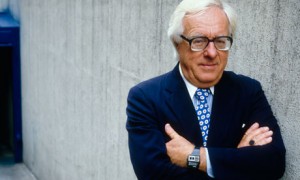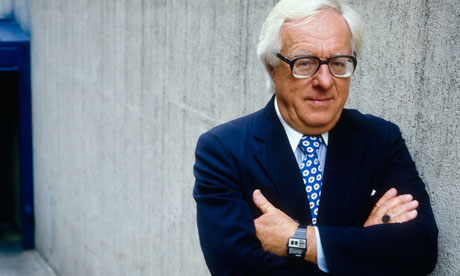 Ray Bradbury, legendary science fiction and fantasy author (although he chafed at being “pigeon-holed” as either) whose classics include The Martian Chronicles and Fahrenheit 451, has died at age 91.
Ray Bradbury, legendary science fiction and fantasy author (although he chafed at being “pigeon-holed” as either) whose classics include The Martian Chronicles and Fahrenheit 451, has died at age 91.
At the conclusion of Fahrenheit 451, Bradbury pictures men who have memorized the world’s great books moving along a river’s banks, toward a city, resolving to rebuild a world destroyed by immediate gratification and ignorance. Guy Montag, the novel’s protagonist, reflects on ancient words whose source he does not know but whose significance he nevertheless intuits: “…and the leaves of the tree were for the healing of the nations” (Rev. 22.2, KJV). Montag and his fellow rememberers–people who embody and speak timeless texts, who have become, in a sense, words incarnate–join hands as they look to the future.
As I reflect on that scene, I remember another piece of Scripture: “Let the favor of our God be upon us, and prosper for us the work of our hands–O prosper the work of our hands!” (Ps. 90.17, NRSV). Fahrenheit 451, like much else of Bradbury’s work, not only invites but challenges readers to consider the mark they will leave on the world (see, for example, how human astronauts choose to plunder or preserve Mars’ ancient cities in The Martian Chronicles). What will the work of our hands be–and does it deserve to be prospered?
In daily prayer yesterday, I discovered this verse from the apocryphal book of Ecclesiasticus (Sirach), words spoken by one who sought wisdom: “As my reward the Almighty has given me the gift of language, and with it will I offer praise to God” (51.22). While Bradbury did not identify himself as a Christian, I can’t help but believe God gifted him with a love of language and a way with words that has already benefitted and will continue to benefit generations of readers. Perhaps the way his tales inspire, disturb, and motivate so many to seek a future for the good of all people is an offering of praise to God in and of itself.
For that reason, I will pray that the Lord continue to prosper the work of Ray Bradbury’s hands.


As a teenager I ate up Bradbury’s most famous works. And his short story “The Man” has always been for me a picture of how a believer should actively pursue Jesus to know him more. Though it has been over 20 years since I read it I have often found myself meditating over it, leaving a mark on me and my walk all that time though it be a secular fiction story. I hope that this tale impacts others for years to come.
As a Disney fan, Bradbury left a lasting mark on my fandom as Imagineer’s consulted with the late Walt Disney’s friend Ray Bradbury to develop the look and feel of Epcot to provide the futuristic atmosphere that Disney was looking for.
Daniel – I really like your take on “The Man.” I recently heard a radio play-style adaptation of it. It holds up fairly well. As I recall, the captain was very intent on finding Jesus himself according to his own preconceived notions of who Jesus must be, as opposed to finding Jesus right where he (the captain… and Jesus, for that matter) already was… maybe it can be seen as a parable of works vs. grace?
The Disney connection is interesting, too. Bradbury shaped a lot of folks’ visions of the future. One of his quotes that I like a lot is, “I don’t write science fiction to predict the future – I write science fiction to prevent it.” In other words, stuff like F451 is intended to get us to work to avoid dystopia, not steel ourselves for it. So his work with Epcot seems, to me, to dovetail nicely with that philosophy.
Michael, great article on such short notice! A sad day…
Thanks, Max. Yeah, I found myself surprisingly saddened. It’s not as though I’ve read much of his stuff recently, but it was very influential when I was a teen.
Did anyone else watch “The Ray Bradbury Theater” (a 1980s HBO series adapting his stories)? I enjoyed several of those at the time (haven’t revisited it since.) Bradbury was always a great one for firing the imagination.
May his memory be eternal!
Amen to that, Theron!